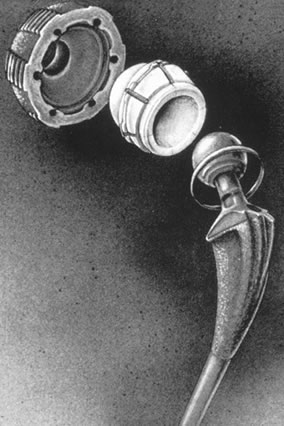
If my total hip or knee joint replacement ever fails, can it be done over?
YES! A highly trained specialist orthopedic surgeon ( like Dr. Stuart Kozinn ) who has completed a Total Joint Replacement Fellowship or has other advanced experience can re-do your joint. It is a more complicated procedure than primary arthroplasty. The surgeries are longer, and mechanical solutions often unique. The results are generally very good, although not quite as good as primary total joint replacement.
Why is revision joint replacement more complicated?
After years of implant use, the remaining bone quality can be compromised, and special techniques are required to “rebuild” the bone supporting the new implants. Sometimes we use bone from cadavers (bone graft) or metal augments to rebuild the bone during a revision joint replacement.
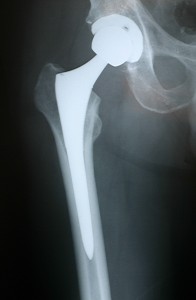
The bone is softer, and more prone to fractures. Incisions are larger (not possible to do through a mini incision), and blood loss is greater.
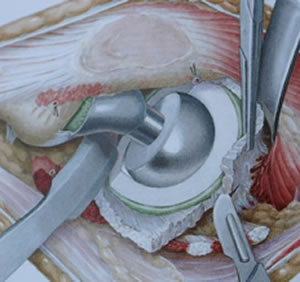
How hard is it to get the old joint out?
If the old joint is loose, it is quite easy to remove. If the joint fails for another reason, it can be very difficult to get out. The hardest implant to remove is an old fully femur stem implant that is fully grown in with bone. Sometimes this requires the surgeon to split the femur and then repair it with cables. It is actually easier to remove a cemented implant, because we can crack the cement with chisels and loosen the implant bond.
Is the recovery longer than usual?
Sometimes it is. Often crutches are needed to take weight off of the healing bone (particularly if the femur has been split). Sometimes the recovery is similar to a primary joint replacement, particularly if the re-do surgery involved only a plastic liner exchange. The possible complications are similar to primary joint replacement, although dislocation risk of hip implants is increased, and the infection rate is higher. This is mostly because more soft tissues are stripped from the bone during implant removal, and there is more bleeding.
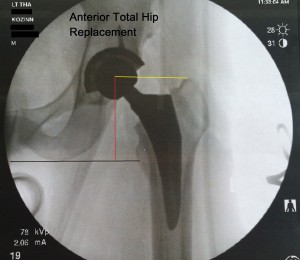
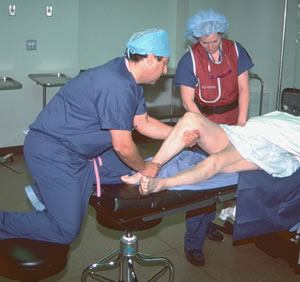
Why would a hip replacement dislocate?
Most don’t ! … however 2 to 5 % of hips may come “out of socket” during their lifetime if the range of motion is exceeded, particularly if there is a pushing force to tear through soft tissue constraints. (Clipping toe nails is the number one mechanism of dislocation – have someone else do it!). This is why we ask hip patients done through a posterior approach to avoid early bending or crossing of the legs, which can “lever” the hip out of place. If your hip does come out, call an ambulance to bring you to the ER, as your hip will need to be reduced under anesthesia to relax the muscles. A special kind of hip may be needed to prevent dislocation a second time. It has a metal ring around the cup to prevent the head from popping out. It is called a“constrained liner”. (Pictured Below)

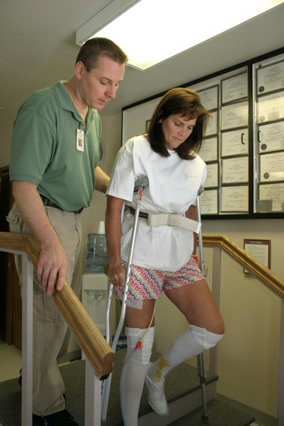
How long will I be in the hospital after revision surgery?
Most revision patients stay one extra day in the hospital..usually three days total. This allows for more therapy and wound care before discharge. Some patients will have to protect the repair by walking with a walker or crutches partial weight bearing. Antibiotics are given to prevent infection, and blood thinnners are given to protect against clots in the veins.
When I be able to get off crutches and resume normal activities?
Revision surgeries may have different healing periods. Most patients will be healed by 3 months after surgery and crutches can be discontinued at 4 to 6 weeks. A period of physical therapy is usual for about a month after surgery. Most sutures come out two weeks after surgery.
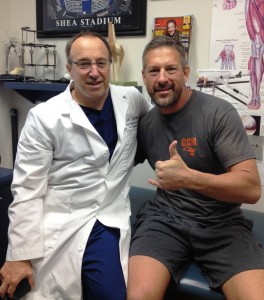
You can shower after surgery, but you should not soak the wound in a tub or pool for 3 weeks to avoid possible infection.
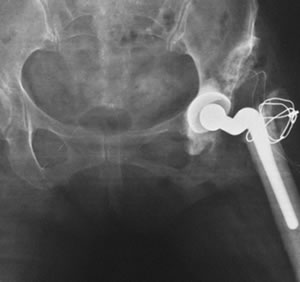
Can the joint be revised more than once?
Yes, and younger patients may have two or three replacement operations in their lifetime. Special implants are available that fit unique situations. besides loosening from the bone, other possible reasons for revision include infection, implant breakage, osteolysis (bone loss from particle debris), and dislocation.
Why would my joint become infected?
Infection is rare but possible. About 1% of hips and knees will become infected. An early infection can often be cured by washing the joint out in the operating room and giving 6 weeks off IV antibiotics. Chronic infections, usually presenting later may require full removal of the joint and replacement with a new one in 1 or 2 stages.
